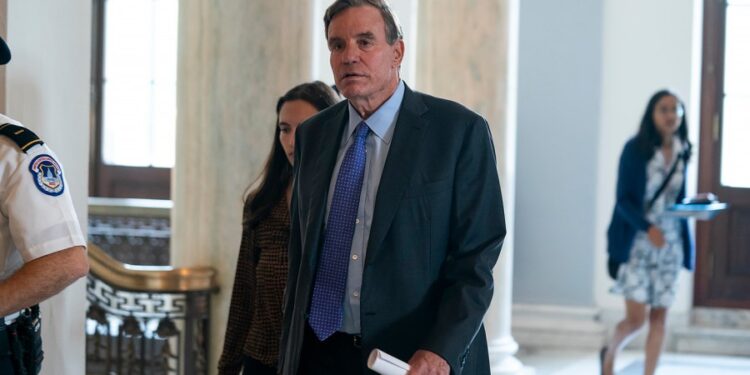
Ahead of expiring measures in the tax code scheduled for next year, Sen. Mark Warner (D-Va.) said Thursday that neither Democrats nor Republicans were particularly trustworthy when it comes to the subject of taxes and the level of the national debt.
“Frankly, neither political party has any credibility on the issue,” he said.
Warner said the last time there was serious bipartisan consideration of debt and revenue levels was during the Obama administration’s Simpson-Bowles commission, which resulted in recommendations to cut Social Security and raise taxes.
“We’re looking at the tax piece. We’ve got to have more revenues, and I know people have tangentially touched on this, but the last time we seriously looked at revenues and expenditures was really the Simpson-Bowles commission,” he said.
The national debt stock at that time was around $14 trillion. Today it’s around $35 trillion, having jumped up to a new plateau after pandemic-related rescue measures including boosted tax credits and stimulus checks.
Following the commission, the seasonally adjusted debt to gross domestic product ratio hovered around 100 percent between 2012 and 2019, before jumping up to its new level around 120 percent since 2020.
Down-to-the-wire negotiations about spending levels and the increasing use of procedural workarounds like continuing resolutions have weighed on the consciences of both investors and the electorate.
A 2023 survey from polling agency Pew found that concerns about the deficit increased between 2021 and 2023, just before a debt ceiling negotiation threatened a U.S. default.
In the aftermath of that fight, ratings agency Fitch downgraded U.S. creditworthiness on concerns about “erosion of governance.”
“In Fitch’s view, there has been a steady deterioration in standards of governance over the last 20 years, including on fiscal and debt matters, notwithstanding the June bipartisan agreement to suspend the debt limit until January 2025,” analysts for the company concluded.
Since the 2010 commission, economic inequality in the U.S. has continued to increase, which was a concern for senators of both parties during a Thursday meeting of the Senate Finance Committee.
The U.S. is the most financially unequal country among wealthy economies in the Organization for Economic Cooperation and Development, behind just Costa Rica and Turkey, whose economies the U.S. dwarfs.
Economist Thomas Piketty and others found in 2018 that average real income before taxes has stagnated for the bottom 50 percent of Americans since 1980 at about $16,000 a year, a number that’s in the ballpark of the latest census data on income and poverty.
Lawmakers are now preparing scaffolding around the tax code for significant revisions expected next year, which will depend greatly on the outcome of the election.
Whether the pattern of Republican-driven tax cuts that are then left in place and extended temporarily with the participation of Democrats will continue, or whether a new revenue architecture is put in place, remains to be seen.
Some lawmakers have been playing around, at least rhetorically, with some big legal ideas ahead of next year’s fight.
Sen. Chuck Grassley (R-Iowa) brought up the consequential concept of corporate personhood in the Thursday Senate Finance Committee meeting.
“We all know that a corporation is a legal document. It’s made up of management, it’s made up of stockholders, it’s made up of employees, and the results of the corporation [are] covered by the consumers. So corporations don’t pay taxes. It’s coming out of the pockets of all these other people I just mentioned that are corporations. Corporations don’t pay taxes — people pay taxes,” Grassley said.







